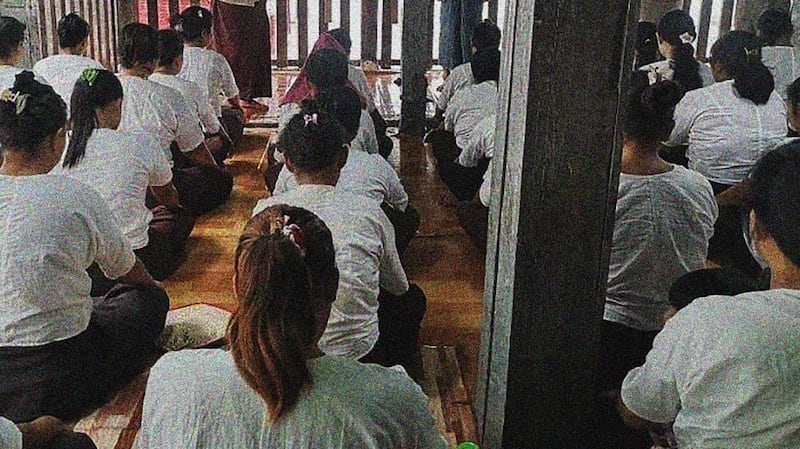This report contains graphic content that may be disturbing to readers. Discretion is advised.
Female political prisoners in Myanmar’s prison system are routinely sexually harassed by prison staff under the pretext of “security checks,” several former inmates told Radio Free Asia.
The harassment is in line with the general increase in widespread prisoner abuse in Myanmar since the Feb. 1, 2021, coup.
A former inmate at Maubin prison in the southern region of Ayeyarwady told RFA Burmese on condition of anonymity for security reasons that she was subject to sexual harassment by the prison guards.
“We had to take off our shirts, brassieres and underwear,” she said, adding that the women were given prison underwear and a sarong wrapping to cover their bosom. “They physically searched our bodies. They made a manual body cavity search. They manually examined the area between the thighs. They also squeezed our brassieres.”
She recounted an incident where a young woman protested the invasive search while on her period, asking for an exception.
“They didn’t accept her request and told her to take off [her underwear],” the former inmate said. “The young lady felt ashamed because there were stains on her pad.”
The former inmate said that she is still traumatized by her time in Maubin prison.
“I had to live with my body and their souls,” she said. “I had to live with their souls for more than a year. I never fully recovered from the trauma.”
Human rights violation
Such searches of female inmates is a human rights violation, Thike Tun Oo, spokesperson for the Political Prisoners Network in Myanmar, told RFA.
“The prison manual stipulates that you have no right to search female political prisoners’ private parts without their consent,” he said. “Without installing X-ray machines or body scanners, oppressing women [by conducting physical searches] is, we can say, the worst human rights violation.”
Some point out that although the prison manual stipulates to conduct body searches for suspected inmates in order to prevent them from carrying prohibited documents, cash or drugs and other substances hidden in their bodies, not every prisoner will be subjected to search.

Hnin Si, a former female political prisoner, said that such sexual abuses also occur often at the Insein and Thayarwady prisons.
“When they search, they put their hands into the brassieres. Some [prison] staff put their hands into the female sexual organs,” said Hnin Si. “It is a kind of sexual assault against the female inmates in every prison. We had only sarong on our bodies. Even during our periods, we have to show them our underpants.”
She said that during her time in Yangon’s Insein prison, she and others had to deal with sexually explicit comments during body searches.
“We were sexually abused by staff who put their hands into our brassieres and organs and said your body parts are small, and yours are big,” she said.
The prison manual stipulates that female inmates must be closely supervised by female prison staff only.
Must be held accountable
However, Hnin Si said that the female political prisoners who were locked up in solitary confinement in Thayarwady Prison were dragged out by the male prison staff using harsh words. If there was a fight in the women’s ward, the male staff would come in and beat the women, she added.
RFA’s calls to the office of the deputy director general and the junta’s spokesperson for the prison department went unanswered.
Prison officers and staff members who commit crimes against women must be held accountable, said Naw Khin San Htwe, the general secretary of the Burmese Women’s Union.
“The terrorist military council’s inhumane torture and sexual harassment against women and LGBT people who are politically active is a crime that cannot be tolerated,” she said.
“This is something that should not be committed from the perspective of human rights and international standards and from the perspective of law,” she said. “But the terrorist army and the terrorist military council continue to commit crimes with impunity.”
According to the Thailand-based Assistance Association for Political Prisoners, since the Feb. 1, 2021 coup, the government has detained 5,237 female political prisoners.
Translated by Htin Aung Kyaw. Edited by Eugene Whong and Malcolm Foster.
